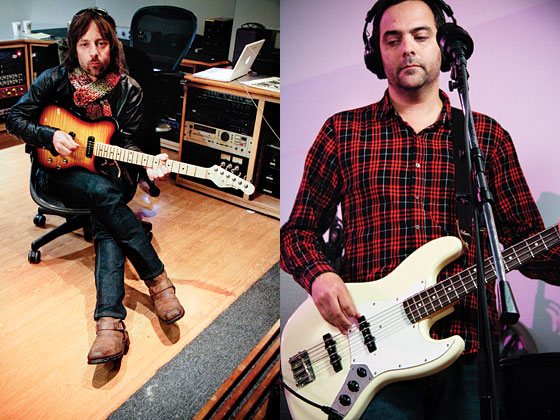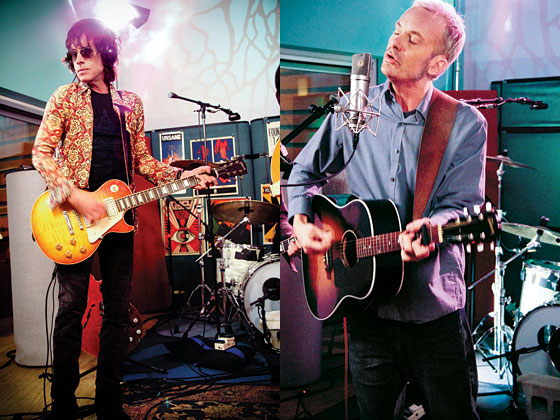
In the mid-nineties, before they had an act, a deal, or even a band name, Adam Schlesinger and Chris Collingwood could be found at WXOU Radio Bar on Hudson Street, jotting down potential song titles on napkins, daring one another to take home a name and write a song around it. Some were drily straightforward (“She’s Got a Problem”), others knowingly goofy (“Please Don’t Rock Me Tonight”). “It was a little game we played,” Schlesinger says. “A challenge to each other.”
The two had met at Williams College, playing together in various combos, and they found they shared a love of the tightly constructed sixties pop of bands like the Zombies and the Hollies. After relocating to New York, they eventually named their new band after a lawn-ornament store in North Jersey: Fountains of Wayne.
Schlesinger, 43, with minor stubble and owlish eyes, recalls this while sitting in a tiny room at Chelsea’s Stratosphere Sound, the recording studio he co-owns, where Fountains of Wayne recorded Sky Full of Holes, the group’s latest album of reliably clingy, wryly observed power pop. It’s the band’s fifth album since their 1996 self-titled debut, which they made as a duo; they recruited Jody Porter and Brian Young to play the music onstage. That album established Fountains as alt-rock upstarts, thanks largely to “Radiation Vibe,” a cryptic sugar rush from the post-Kurt, pre-Durst era, when skinny guys could get on MTV using little more than an unshakable chorus and a few fish-eye-lens effects. Within a year, they were opening for the Smashing Pumpkins.
The band had only one other big hit—“Stacy’s Mom”—yet their fans remain devout. “When you’re listening to them, you feel like you know the singer,” notes their friend James Iha, former Pumpkins guitarist and Stratosphere partner, who describes Fountain fans as “guys with long black leather coats, married couples, aging hipsters, and a few power-pop stalkers. At their shows, it looks like you’re at Borders books.”
On 1999’s Utopia Parkway and 2003’s Welcome Interstate Managers, the group buffed their sound to a New Wave sheen while focusing their narrative gaze upon the everyday life of the working stiff. Both albums were set largely within the outer boroughs and the burbs. “Bright Future in Sales” finds a sloshed office drone dozing off at Port Authority, dreaming of middle management, while “Red Dragon Tattoo” follows a love-struck goof as he rides the N to Coney Island for some ill-advised ink.
In 2003, the crunching MILF anthem “Stacy’s Mom”—promoted via a skeevy video starring Rachel Hunter as a barely clad housewife—went gold and earned a Grammy nomination. But to those who were too young to remember “Radiation,” its humor made the band seem a bit like a novelty act. “I’d look like a spoiled jackass if I said I resented it,” says Collingwood, 43, calling from Northampton, Massachusetts, near where he now lives. “It exposed a lot of people to the band. On the other hand, a lot of those people are not music fans. We’d get people at our shows holding up signs that said MY DAUGHTER’S NAME IS STACY.”
Schlesinger and Collingwood have always functioned as a sort of creative duopoly, never writing together and generally splitting the albums’ lineups 50-50. The two men’s personal and musical dispositions are at odds: Schlesinger, upbeat and chummy, is responsible for many of the band’s humorous everyday-people narratives, as with “Stacy’s Mom”; the somewhat more droll Collingwood leans toward the fractured imagery and pathos found on “Radiation Vibe.” On record, the two styles co-exist peacefully, but Schlesinger and Collingwood admit to frequent creative squabbles (Collingwood jokes that the band nearly breaks up “about once a week”).
“I wish I could say that we are as good friends as when we were sophomores at college,” says Schlesinger, “but we know each other so well, and sometimes that can be a great thing, and sometimes it can be a bad thing. The funny thing is, I feel like when we’re together, we have a great time. And then, when we’re all in different places, sometimes we’ll get into, like, e-mail fights.”
As singer-songwriter Lloyd Cole, another onetime Radio Bar regular, says, “It’s amazing that they are still working together. But I guess the Who lasted quite a while.”
Fountains had always taken long hiatuses between albums, and Sky is no exception. Schlesinger has been busy with various film, TV, and stage work, his Cry-Baby musical and his side project, Tinted Windows. Collingwood, who also has a country-music group called Gay Potatoes, spent much of 2007 recovering from a booze- and insomnia-fueled breakdown he had around the time of the group’s erratic fourth album, Traffic and Weather (“I sort of checked out of the being-in-a-band thing,” he says).

Whatever tense alchemy exists between Schlesinger and Collingwood still works. The first single off Sky, “Someone’s Gonna Break Your Heart,” is a bullet train of power chords, chiming pianos, and beguiling wordplay. But now workaday tales are undercut with dread: “Richie and Ruben” details a string of failed business deals; “The Summer Place” finds a family being undone by decades-old rifts; and “Action Hero” stars a put-upon father coming to terms with his own mortality. The middle-class heroes of Utopia Parkway are now an endangered species. Tellingly, their namesake store in Jersey went out of business in 2009.
Both Collingwood and Schlesinger insist that whatever themes emerge from each new record are largely an afterthought—that these are accidental concept albums, reflections of their observations and adventures. Their ability to conjure big stories from small moments is what’s helped make Fountains so relatable for so long. “If you write something very specific and little,” says Schlesinger, “people can just get into it as a story, then they can step back and see if it says anything bigger than that.”
Fountains has never been considered a New York City band: They were too arch to fit in among the balladeers of the early nineties and too square for the later downtown-rock revival. But few groups have chronicled the city—its landmarks, its dreamers, its rich peripheries—with such care.
One of Sky’s numbers is called “Radio Bar.” The band’s history at the joint doesn’t end with those late-night BS sessions: Schlesinger even met his wife there. A few months ago, Collingwood, in a rare trip to the city, stopped by and checked out its jukebox. Fountains remains enshrined: “Radiation Vibe” is selection 20-01. “It’s still there,” he says. “The people who put us in there aren’t there anymore, but we’re still there. It’s a good hangout. A good little bar.”
Sky Full of Holes
Fountains of Wayne.
Yep Rock Records.